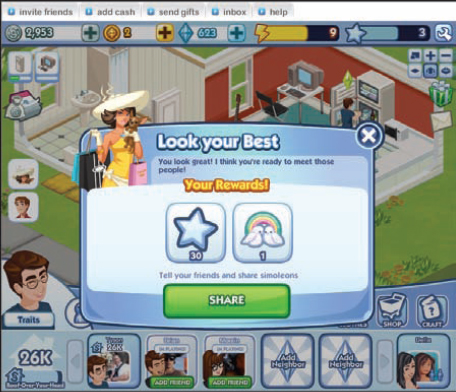IGNORING FACEBOOK CONVENTIONS
There are a lot of things you can learn by picking up a book on Facebook monetization, but all of them don't necessarily translate well to iOS apps, nor do iPhone users expect the same type of experience they can get on Facebook. Usage patterns are different, session times on iPhone are shorter, and people expect more entertainment in shorter bursts for their time (as proven by the low price of apps and heavy competition in most niches). The exception to this would be the iPad, because session times are more on par with using a PC, in addition to the resolution offered.
For iOS devices, however, the much better graphic processing power, in addition to user expectations compared to that of games in Flash (which have traditionally lower expectations in terms of polish because of the sheer number of them and graphic capabilities), result in different user experience expectations. Following are two examples of Facebook conventions you should consider ignoring altogether, or special-tailor them to suit your audience on behalf of the iOS user.
Waiting Is Not Fun
Many of Facebook's most popular apps are built on a monetization model that makes users wait for currency and progress rewards from their various virtual world objects. For example, in “Farmville” (and almost all other apps like it, including “Smurfs' Village” for iOS), the main driving incentive for earning game currency and experience toward new levels is having to wait for your planted crops to grow, in real time. Even the recently released “Sims Social” has implemented this into its monetization scheme when none of the previous PC “Sims” games had any sort of mechanism like it.
What this does (and is not necessarily fun) is drive user retention to come back and “harvest” these crops when they are ready for the rewards, then plant/build more and repeat the process. Some games do it slightly differently, but the method is the same — making users wait in real time for rewards.
Although this is a smart (though increasingly ubiquitous) way to drive retention, if you have elements like this, you must also look to drive user engagement within the app to extend session times for things other than simply planting and waiting for rewards. Things like social engagement, mini-games, customization of the world, actual gameplay or character progress, and more, are valuable engagement tools that can be used to offset the rather mundane mechanism of planting and waiting.
Fortunately, “Sims Social” also does this in spades; thus, that's one of the reasons it is so popular. In other words, be sure that this type of mechanism, if implemented in your game, is only a small portion of your overall retention dynamic.
No Forced Friends, Please
In 2008, Facebook had a problem. Many games and other apps were essentially forcing users to add friends in order to progress. To get to the results of some quiz, poll, or prize, users were often forced to add a certain number of friends just to skip. Some games started the trend of requiring a certain number of friends to expand land or further advance. The main problem was not so much in asking a friend to play or “be a neighbor,” but rather it was that the asking became what is known as friend spam. Your wall would get flooded with friend requests and free gifts encouraging you to play their game.
While Facebook put a Band-Aid on the problem by requiring a skip or cancel button, the practice of requiring friends (understandably for the viral effect) has become almost a study in how to find loopholes in the law of whichever platform you're monetizing on.
Enter iOS apps. As Apple moves Game Center more toward open social networking conventions and communication outlets, it will be very tempting to see what early advantages you can glean. But keep in mind that overuse of mechanics that rely on adding friends can be just as big a turn-off to users as those that don't utilize friends at all.
The virtual currency-based freemium game “Smurfs' Village” takes a positive (yet subtle) approach to this aspect. Friends can provide some advantages to your built-up village, and gift you with the occasional item that you cannot find without them. But there is never a requirement that you add friends in order to get even a significant portion of value back. For example, none of the items for sale require X number of friends to buy. It's supplemental and additive, rather than part of the core experience.
You should find ways to incentivize social behavior and make use of viral channels without relying on it, instead of forcing the issue. When asking a user to share his or her achievements, consider providing a free benefit to all those who might see the post. In other words, consider combining gifting and promotion to provide both bragging rights and incentives for other users, and not just in a competitive way.
In Figure 10-9, “Sims Social” (which is a relatively newer, but highly popular Facebook app) does this with all of its sharing prompts. And, speaking of promotion and rewards, this provides a good segue to the next section.

FIGURE 10-9: “Sims Social” for Facebook combines rewards for everyone for each share opportunity
